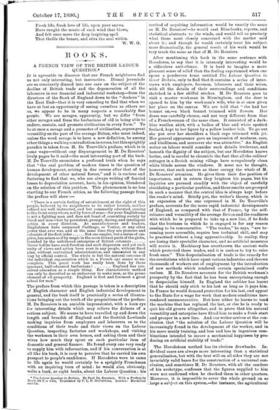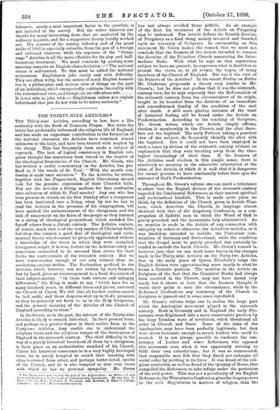BOOKS.
A FRENCH VIEW OF THE BRITISH LABOUR QUESTION.* IT is agreeable to discover that our French neighbours find us not only interesting, but instructive. Dismal jeremiads are so constantly dinned into our ears on the subject of the decline of British trade and the degeneration of all the labourers in our financial and industrial workshop—from the directors of the Bank of England down to the " dockers " in the East End—that it is very consoling to find that when we have at last an opportunity of seeing ourselves as others see us, we appear to be in many respects a remarkably fine people. We are savages, apparently, but we differ "from other savages and from the barbarians of old in being able to endure, sustain, and promote civilisation in every form." To beat once a savage and a promoter of civilisation, argues great versatility on the part of the average Briton, who must indeed, unless the word savage is to have a new definition, be among other things a walking contradiction-in-terms, but this sprightly paradox is taken from M. De Tonrville's preface, which is in some ways—without any disparagement to M. De Rousiers' lively pages be it said—the most interesting part of the book. M. De Tourville enunciates a profound truth when he says that "the real problem of modern times is the question of human development, arising in due course after that of the development of other natural forces," and it is curious and flattering to find that we, who are always writing off fancied losses to depreciation account, have, in his opinion, blundered on the solution of this problem. This phenomenon is no less startling to our French critics, as the following passage from the preface will show :—
"There is a certain feeling of astonishment at the sight of this people, believed by its neighbours to be rather boorish, neither refined nor well instructed, and but summarily educated, coming to the front everywhere, not by force of arms—for your Englishman is not a fighting man and does not boast of cementing society by blood and iron—but by persistent, prompt, daring, and intelligent action in every direction. As manufacturers and traders, Englishmen have surpassed Carthage, or Venice, or any other power that ever was, and at the same time they are pioneers and colonists of the first order Not one empire, but a series of em- pires, has arisen as if by magic in the most distant parts of the globe,
founded by the unfettered enterprise of British colonists Never before have such freedom and such dispersion and yet such unity of views and action been seen in any people, without fixed plan, without centralised administration, and unassisted in any way by official controL The whole is but the natural outcome of the individual organisation which to a French eye seems so un- complete. This great work has really been done by these
ignorant, half-educated barbarians 1 England has con- ceived education as a simple thing. Her characteristic method can only be described as an endeavour to make men, as the prime element of all prosperity. England is first and foremost a great school for men."
The preface from which this passage is taken is a description of English character and English industrial development in general, and the book itself is practically a series of illustra- tions bringing out the truth of the propositions of the preface. M. De Rousiers is an amiable impressionist, with a keen eye for interesting details which may relieve the dulness of a serious subject. He seems to have travelled up and down the length and breadth of England and the Scottish Lowlands making inquiries from employers and labourers as to the conditions of their trade and their views on the Labour Question, inspecting factories and workshops, and visiting the workmen in their own homes, and asking them and their wives how much they spent on each particular item of domestic and general finance. He found every one very ready to supply him with information, and if his conversation is at all like his book, it is easy to perceive that he carried his own passport to people's confidence. If Herodotus were to come to life again he would certainly be a sprightly Frenchman with an inquiring turn of mind : he would also, obviously, write a book, or eight books, about the Labour Question : hia
• The Labour Question in Britain. By Paul De Rousiers. With a Preface by Henri De Tou rale, Translated by F. L. D. Herbertsou. London: Macmillan and Co.
method of acquiring information would be exactly the same as M. De Rousiers'—he would cad Blue-books, reports, and statistical abstracts to the winds, and would tell us precisely what those most closely concerned with the matter said about it ; and though he would certainly treat his subject more dramatically, the general result of his work would be very much the same as that of M. De Rousiers.
After mentioning this book in the same sentence with Herodotus, to say that it is intensely interesting would be a ridiculous anti-climax. It is bard to imagine a more pleasant sense of relief than the feeling experienced when one opens a ponderous tome entitled The Labour Question in Great Britain, only to find that it contains a series of inter- views with employers, foremen, labourers and their wives, with all the details of their surroundings and conditions sketched in a few skilful strokes. M. De Rousiers goes to visit a master workman in Birmingham, and the door is opened to him by the workman's wife, who is at once given her place on the canvas. We are told that "she had her bonnet on,—a black bonnet trimmed with flowers. Her dress was carefully chosen, and not very different from that of a Frenchwoman of the same class. It consisted of a dark- blue woollen skirt, with a bodice of blue and white spotted foulard, kept to her figure by a yellow leather belt. To go out she put over her shoulders a black cape trimmed with jet. Her general appearance gave an impression of neatness, care, and kindliness, and moreover she was attractive." An English writer on labour would consider such details irrelevant, and beneath the dignity of the subject, but our Herodotus knows better, and is careful to chronicle the fact that all the colliers' cottages in a Scotch mining village have scrupulously clean white blinds across the windows. It must not be thought, however, that such matters as these occupy the whole of M. De Rousiers' attention. He gives them their due position of importance, and in return they brighten his pages, but his inquiries are pursued steadily with the object of carefully elucidating a particular problem, and these results are grouped in such a manner that the central idea is always kept before the reader's mind. Briefly put, the writer's theory, which is an expansion of the one expressed in M. De Tourville's preface, accounts for the more rapid industrial developments of England, as compared with that of France, by the self- reliance and versatility of the average Briton and the readiness with which he is prepared to take up a new line, if he finds that the business in which he is engaged is for any reason ceasing to be remunerative. "The trades," he says, "are be- coming more accessible, require less technical skill, and may be practised without a long apprenticeship. In reality, they are losing their specialist character, and no artificial measures will revive it. Machinery has overthrown the ancient walls which protected these trades, and it is useless to try to raise fresh ones." This despecialisation of trade is the remedy for the revolutions which have upset various industries and thrown thousands of workers out of employment by the introduction of new methods which rendered certain specialised crafts useless. M. De Rousiers accounts for the British workman's prosperity by the fact that he has been enterprising enough to despecialise himself. In England the cobbler has learnt that he should only stick to his last as long as it pays him. In France he would demand protection for his last, and appeal to the State for a wage for work that modern conditions have rendered nnremunerative. But here either he learns to tend the machine that has replaced the last, or else he is ready to quit his old groove altogether, and to prove that his natural versatility and enterprise have fitted him to make a fresh start and prosper in a new line. And our writer arrives at the con- clusion that "the solution of the Labour Question will be increasingly found in the development of the worker, and in his more manly training, and less and less in ingenious com- binations intended to insure a mechanical happiness by pro- ducing an artificial stability of trade."
The Herodotean method has its obvious drawbacks. In- dividual cases are always more interesting than a statistical generalisation, but with the best will on all sides they are not invariably valid bases for the construction of a universal con- clusion, and sometimes M. De Rousiers, with all the candour of his archetype, confesses that the figures supplied to him were not confirmed when he checked them in other quarters. Moreover, it is impossible to cover the whole ground on so large a subject on this system,—for instance, the agricultural labourer, surely a most important factor in the question, is not included in the survey. But the writer deserves our thanks for many interesting facts that are neglected by the ordinary inquirer, and for a suggestive theory lucidly worked out. His account of the mining industry and of the great strike of 1893 is especially valuable, from the pen of a foreign and unbiased observer, while his exposure of the " living- wage " doctrine is all the more effective for its airy and half. humoroustreatment. We must conclude by quoting some amusing remarks on English characteristics :—" The national virtue is self-control. To this must be added the national seriousness. Englishmen joke rarely and with difficulty They are often witty, but the source of much English humour lies in a philosophic and serious view of things on the part of an individual, which unexpectedly contrasts the reality with the conventional view, and brings out its ridiculous side It is not wise to joke with an Englishman unless you explain beforehand that you do not wish to be taken seriously."







































 Previous page
Previous page